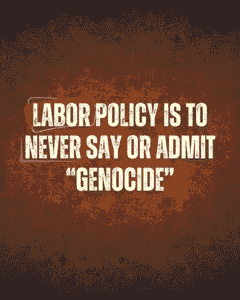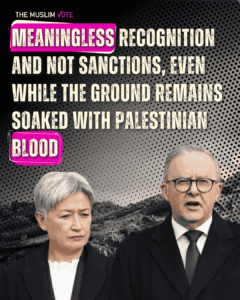When Intelligence Becomes Propaganda: Burgess and the Politics of Fear

Mike Burgess, Australia’s ASIO boss, gave another lecture this week, another performance wrapped in the language of national security. His words were familiar: warnings about “division,” talk of “social cohesion,” and a jab at Hizb ut-Tahrir, although actually designed to demonise all Muslims. But strip away the jargon, and what’s left is the same tired script that has guided political messaging for two decades: the problem is always them, never us. Burgess, who once declared that “Sunni (Muslims) pose the greatest religiously motivated threat in Australia”, now pretends to speak for social cohesion (whatever that term actually means). In his latest lecture, the rhetoric was deliberate, the omissions calibrated, and the venue symbolic. What he delivered was not intelligence but orchestration, an exercise in narrative management masquerading as public warning.
Subscribe to stay informed
The Rhetorical Coding
When Burgess uses terms like “our country” and “shared values“, this is not accidental; it is prejudice hidden inside patriotism. The phrasing sets up a binary between those inside the moral perimeter and those who might threaten it. In security discourse, possessive pronouns carry weight. They delineate insiders and outsiders, turning disagreement into disloyalty. This is the language of exclusion under the pretext of protection. Burgess isn’t speaking as a protector of public safety. He’s acting as a cultural gatekeeper, drawing the line between who belongs and who should be suspect. It’s a political act, not a security assessment. And it’s one that tells us far more about the insecurity of Australia’s institutions than about the supposed fake dangers of any community. Let’s be honest about what’s going on. Every time global scrutiny turns toward Australia’s foreign policy, the political class reaches for its most reliable tool: domestic fear. Burgess’s speech was not about intelligence; it was about insulation. It shields the government from having to confront its complicity in genocidal violence in Gaza by Israel, and refocuses public anxiety on legitimate opposition at home.
The Stage and the Audience
Burgess chose the Lowy Institute. The Lowy Institute is an organisation funded by Zionists and pro-Israel figures. This choice to speak before them is clearly an allegiance to a political bloc that has shaped Australia’s silence on Palestine for decades. It is a foreign-policy forum ideologically aligned with Western security orthodoxy, Zionism and pro-Israel alliances. He’s speaking from within a geopolitical bubble, not a neutral forum. This was a sermon to reassure elites that ASIO remains ideologically faithful.
The Bogeyman Tactic: ASIO’s False Pretext for Policing Muslim Dissent
The same man who once claimed Sunni Islam posed the greatest religiously motivated threat in Australia now uses Hizb ut-Tahrir as a pretext to warn all Muslims about dissent. This isn’t about Hizb ut-Tahrir; it is about a tactic: cite one name as the bogeyman to warn against and curtail all forms of legitimate dissent. By turning a single group into the emblem of “division,” Burgess re-opens the door to treating Muslim civic engagement as a security problem rather than a democratic one. Legitimate opposition to the state, no matter who voices it, is the essence of democracy, not a threat to it. Protest and activism have always challenged state power; they are rights grounded in justice and conscience, not in state permission. But the message of Burgess and the government is unmistakable: any challenge to the status quo, particularly from Muslims, will be treated not as participation but as provocation. When the right to oppose power is pathologised (i.e. viewed as something abnormal or dangerous, rather than a legitimate political or moral stance), what is lost is the distinction between governance and control. The point is not who speaks, but that legitimate dissent and protest itself is being criminalised. When the state decides which voices may speak, it is not protecting order; it is manufacturing consent to its own authority.
Subscribe to stay informed
Gaza: No Mention
The genocide in Gaza gets zero mention by Burgess, nor any recognition that Australians who have fought in the Israeli Occupation Forces (IOF) and killed Palestinians, and what threat poses to Australia. In his public remarks, the violence inflicted on Palestinians is treated as background noise while protests become the foreground risk. There is no mention of Australia’s supply chains feeding that war. The bomb dropped abroad doesn’t count as violence, but the protest sign at home does. Security becomes the vocabulary through which the state defends its own complicity. While the world and Australians are questioning Western geopolitics, the head of ASIO steps forward to remind the country who the real problem supposedly is. It’s not the war criminals; it’s the people angry about them.
No Oversight
ASIO’s public briefings operate without interrogation. Burgess can label movements “threats” without producing evidence, and no parliamentary committee cross-examines the performance. It is a constitutional loophole disguised as transparency: intelligence by proclamation. No other public official enjoys the privilege of accusation without rebuttal. That asymmetry turns the national-security podium into a pulpit of impunity.
Burgess doesn’t guard the nation; he guards its narrative. And as long as that narrative depends on keeping one community perpetually suspect, Australia will never be secure, not morally, not politically, and not socially. His real achievement is not preventing terror, it is manufacturing it in the national imagination.




